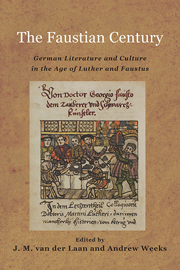Book contents
- Frontmatter
- Contents
- List of Illustrations
- Acknowledgments
- Introduction: Faust Scholarship and the Project at Hand
- 1 The German Faustian Century
- 2 Faustus of the Sixteenth Century: His Life, Legend, and Myth
- 3 Cornelius Agrippa's Double Presence in the Faustian Century
- 4 Converging Magical Legends: Faustus, Paracelsus, and Trithemius
- 5 Faust from Cipher to Sign and Pious to Profane
- 6 The Aesthetics of the 1587 Spies Historia von D. Johann Fausten
- 7 The Lutheran Faust: Repentance in the Augsburg Confession and the German Faustbuch
- 8 Marriage in the Historia von D. Johann Fausten (1587)
- 9 Antiauthoritarianism and the Problem of Knowledge in the Faustbuch
- 10 Exploring the “Three-Fold World”: Faust as Alchemist, Astrologer, and Magician
- 11 The Devil in the Early Modern World and in Sixteenth-Century German Devil Literature
- 12 Encounters with “Schwarz-Hans”: Jacob Böhme and the Literature of the Devil in the Sixteenth Century
- 13 D. Johann Faust and the Cannibals: Geographic Horizons in the Sixteenth Century
- A Sixteenth-Century Chronology of Significant References to Faust with Parallel World Events
- Select Bibliography
- Notes on the Contributors
- Index
13 - D. Johann Faust and the Cannibals: Geographic Horizons in the Sixteenth Century
Published online by Cambridge University Press: 05 May 2013
- Frontmatter
- Contents
- List of Illustrations
- Acknowledgments
- Introduction: Faust Scholarship and the Project at Hand
- 1 The German Faustian Century
- 2 Faustus of the Sixteenth Century: His Life, Legend, and Myth
- 3 Cornelius Agrippa's Double Presence in the Faustian Century
- 4 Converging Magical Legends: Faustus, Paracelsus, and Trithemius
- 5 Faust from Cipher to Sign and Pious to Profane
- 6 The Aesthetics of the 1587 Spies Historia von D. Johann Fausten
- 7 The Lutheran Faust: Repentance in the Augsburg Confession and the German Faustbuch
- 8 Marriage in the Historia von D. Johann Fausten (1587)
- 9 Antiauthoritarianism and the Problem of Knowledge in the Faustbuch
- 10 Exploring the “Three-Fold World”: Faust as Alchemist, Astrologer, and Magician
- 11 The Devil in the Early Modern World and in Sixteenth-Century German Devil Literature
- 12 Encounters with “Schwarz-Hans”: Jacob Böhme and the Literature of the Devil in the Sixteenth Century
- 13 D. Johann Faust and the Cannibals: Geographic Horizons in the Sixteenth Century
- A Sixteenth-Century Chronology of Significant References to Faust with Parallel World Events
- Select Bibliography
- Notes on the Contributors
- Index
Summary
“Die gantze Welt,” or “The Whole World” except America
“In Goethe's Faust, the “merry companions” have barely tasted the wine Mephisto has conjured up in Auerbach's Cellar when they break into the otherwise unknown ditty
Uns ist ganz kannibalisch wohl,
Als wie fünfhundert Säuen!”
[We feel cannibalistically good,
Just like five-hundred sows!]
How does something having to do with cannibals find its way to Leipzig? Or: why does Faust bump into cannibals on his trip through the “small world,” even if only in the lyrics of a song that is immediately dismissed with his “Ich hätte Lust, nun abzufahren” (I'd like to leave now, 2296)?
Cannibals are, after all, man-eaters found in exotic latitudes. Goethe could easily have learned about them from Zedler's Universallexicon: “Cannibals or Caribs” are “a people who inhabit the Antilles Islands from which they have their name …, now however only a few of them live there. It was their custom to eat the prisoners they took in war after they let them go hungry for 3 days, so everywhere they ate up the dead bodies of their enemies found on the battlefield.” The 1793 second edition of Adelung's dictionary—the standby reference work of its kind in the age of Goethe—added to Zedler's information. Adelung recognized that a cannibal was “figürlich gesprochen,” “ein wilder, grausamer Mensch” (figuratively speaking, a wild, horrible human being), but acknowledged as well the geographically exotic aspect in his primary definition: “ein Einwohner der Karibischen Inseln, welche [sic] ihre Feinde zu essen pflegen” (an inhabitant of the Caribbean Islands, accustomed to eating their enemies.)
- Type
- Chapter
- Information
- The Faustian CenturyGerman Literature and Culture in the Age of Luther and Faustus, pp. 305 - 336Publisher: Boydell & BrewerPrint publication year: 2013



